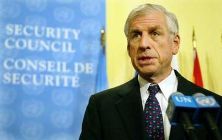US is pushing for more African Union troops to monitor cease-fire in Sudan’s Darfur
By EDITH M. LEDERER, Associated Press Writer
UNITED NATIONS, Aug 26, 2004 (AP) — The United States is pushing for an expanded African Union force to monitor the cease-fire in Sudan’s troubled Darfur region and will support sanctions against Khartoum if the government resists, U.S. Ambassador John Danforth said.
 In an interview with The Associated Press on Wednesday, Danforth said Washington believes the most effective way to improve security for the 1.2 million Sudanese who have fled their homes to escape attacks by government-backed Arab militias is to increase the presence of outsiders in Darfur.
In an interview with The Associated Press on Wednesday, Danforth said Washington believes the most effective way to improve security for the 1.2 million Sudanese who have fled their homes to escape attacks by government-backed Arab militias is to increase the presence of outsiders in Darfur.
“So I think the big push now is to push the presence of outsiders, mainly the AU, as monitors,” he said. “And if the government resists that, then in my view the United States will have been given no choice but to support sanctions.”
The 53-nation African Union currently has 80 observers in Darfur, protected by 150 Rwandan soldiers, to monitor the rarely observed cease-fire signed in April. It has proposed sending nearly 2,000 peacekeepers, an offer strongly supported by the United States but initially rejected by the Sudanese government.
At African Union-brokered peace talks in Abuja, Nigeria, on Wednesday, however, Sudanese Agriculture Minister Majzoub al-Khalifa Ahmad, who heads the government delegation, modified the country’s rejection. He said the government had no objections to an AU force used solely to usher rebels off the battlefield and into their barracks.
Danforth, a former Missouri senator who was the U.S. point man on Sudan before he became the U.N. ambassador last month, didn’t comment directly on Ahmad’s offer. But it clearly didn’t go as far as the United States and other Security Council members want, which is an expanded and highly visible force on the ground monitoring government, rebel and militia activity.
The United Nations says Darfur has become the scene of the world’s worst humanitarian crisis since African rebels rose against the government in February 2003, claiming discrimination in the distribution of scarce resources.
International rights groups have accused the Sudanese government of arming Arab militias known as the Janjaweed to crush the revolt _ an accusation it denies, although last week it acknowledged it has “control” over some fighters.
A resolution adopted by the U.N. Security Council on July 30 gave the government 30 days to demonstrate that it was taking action to rein in the Janjaweed and improve security and humanitarian access. Secretary-General Kofi Annan is expected to deliver a written report on Sudan’s compliance by Aug. 30 and the top U.N. envoy to Sudan, Jan Pronk, will deliver his assessment to the council on Sept. 2.
In an interim assessment Tuesday, Assistant Secretary-General Tuliameni Kalomoh told the council that the United Nations continues to receive reports of attacks by the Janjaweed and of looting and harassment by men in uniform. But he said the government has improved humanitarian access and was cooperating in setting up safe havens for the displaced, council diplomats said.
Danforth said humanitarian access was better though it’s “still not perfect” but “the security problem remains” even though the number and intensity of attacks may have dropped since the resolution was adopted.
The resolution threatened punitive economic and diplomatic measures if Khartoum didn’t move quickly. But Britain’s Foreign Office said Friday a majority of Security Council members oppose immediate heavy sanctions if Sudan fails to quell the violence, which has killed up to 30,000, by U.S. estimates.
Danforth said “the key is not imposing sanctions” but to save the lives of the people in Darfur.
“The possibility of sanctions is pressure on the government of Sudan to fix the problem in Darfur,” he said. “That possibility of sanctions is going to be there five days from now, 10 days from now, a month from now. That’s ongoing pressure. It doesn’t vanish.”
“From the standpoint of the United States, if the people of Darfur continue to be vulnerable, to be pushed around, dispossessed, raped and murdered, then the United States is going to take the position that something has to be done to protect them. And our view is that the most practical thing now is to increase the number of outsiders in Darfur,” Danforth said.
After Kalomoh’s briefing Tuesday, the Security Council backed the U.S. approach giving “strong support” to the African Union’s efforts to tackle the crisis. It also urged government and rebel leaders meeting in Abuja to reach a political settlement and end the violence.
